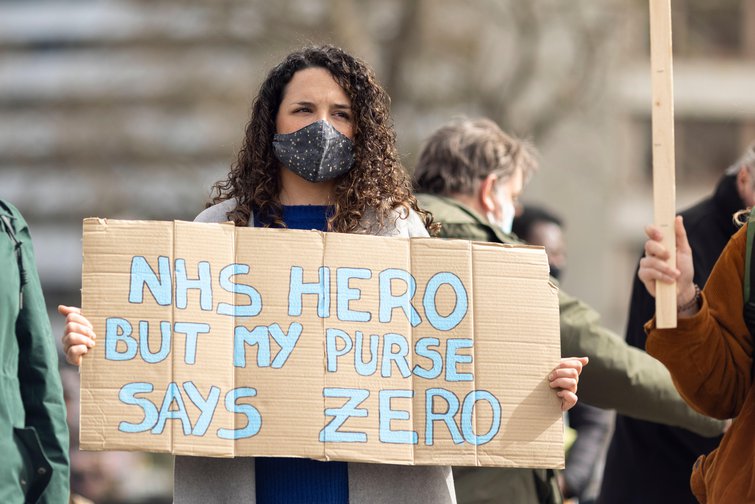A Brief Colonial History Of Ceylon(SriLanka)
Sri Lanka: One Island Two Nations
A Brief Colonial History Of Ceylon(SriLanka)
Sri Lanka: One Island Two Nations
(Full Story)
Search This Blog
Back to 500BC.
==========================
Thiranjala Weerasinghe sj.- One Island Two Nations
?????????????????????????????????????????????????Tuesday, July 27, 2021
A 3% NHS pay ‘rise’ is a disgrace. Our health service needs proper investment
One nurse speaks out on dire working conditions, low pay and the erosion of a vital public service
 |
A protester outside London's St Thomas's Hospital demands a pay rise for NHS staff, April 2021| Joshua Windsor / Alamy Stock Photo
This week, we received news of the long-awaited pay award for NHS staff in England – and it was a pitiful 3%. To call it a ‘rise’ is grossly misleading; after a decade of pay restraint that has seen many of us lose up to 20% of our pay, it still works out as a pay cut in real terms. It’s nothing to be celebrated.
Among colleagues, there is a general feeling of despair. One pointed out that with inflation rising, after bills, petrol and council tax are taken into account, we will be left with next to nothing. Another took it as a sign that the government is happy to see the gap between rich and poor increase, and doesn’t seem too bothered by the potential collapse of our health and social care system.
The NHS Pay Review Body report made for interesting reading. In it, the Department for Health and Social Care argued that since the number of NHS staff is increasing, the overall wage bill needed to be taken into consideration when setting pay rates. But why should the demographic changes affecting demand for the NHS make our earnings fall behind those of other professionals? The report also notes that there is an “unsustainable level of overtime undertaken by the workforce”: don’t we just know it. A recruitment crisis has left us desperately trying to plug the gaps, with low pay and dangerous working conditions. We cannot allow this abuse of our workers any longer.
Many NHS staff work more than 40 hours a week, and some rely on food banks to make ends meet
I have worked as a nurse in the NHS for more than ten years and it has been gut-wrenching to watch services be decimated. I work in child and adolescent mental health, and we are constantly criticised for our waiting lists and high thresholds for referrals. We are giving our all, but it is never going to be good enough with the resources we currently have. Vacancies sit unfilled for months on end, while we go for weeks on end with no beds – NHS or private – available. We are swimming against the tide and it cannot go on. A failure to protect NHS budgets is made worse by cuts to social care, which have added huge pressure since there are not enough services to protect vulnerable people in our communities.
One year ago, I co-founded the grassroots campaign group NHS Workers Say No, along with four colleagues. We wanted to draw attention to the fact that we had entered a global pandemic with a shortage of 100,000 staff, and to push unions to defend us and our patients more fiercely. The NHS and its staff have proved their worth during the pandemic, but we have had to work in unimaginable conditions, with colleagues becoming sick and dying. Many work more than 40 hours a week, and some rely on food banks to make ends meet.
I completely reject the argument that we cannot afford a substantial pay increase. This is about political choices. The government can choose to invest in and strengthen our services, but instead it continues to abuse and degrade us all. A study by the London Economics consultancy, published earlier this year, found that the state would recover at least 80% of the cost of a substantial pay increase for NHS workers, with more taxes going to the Treasury and more consumer spending. That the government doesn’t want to do this raises suspicions that it wants us to fail, so it can continue with the creeping privatisation already underway.
What we are seeing now is real anger, but we have hard work to do if we are going to achieve real results. The consequences of not addressing our dangerously depleted workforce will affect us all. We have a summer of work ahead of us, as our unions ballot for industrial action. We need to continue to mobilise, to encourage colleagues not in a union to join up, and to increase the pressure in fighting for what we are owed.

